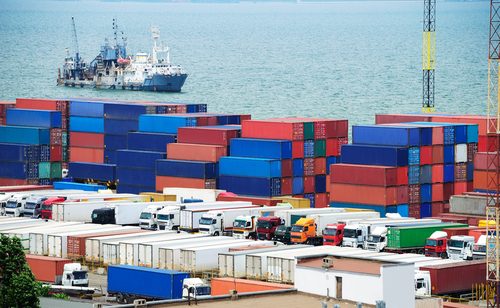February 12, 2015 | Industry Insights
More Than 70 Companies Declare Force Majeure on West Coast

More Than 70 Companies Declare Force Majeure on West Coast
More than 70 trucking companies have sent letters to the Intermodal Association of North America and steamship lines declaring force majeure—that they won’t be able to fulfill contracts because of unforeseen circumstances, according to news from the Harbor Trucking Association reported by American Shipper.
Truckers are being billed for enormous daily charges and demurrage fees for containers and chassis that are sitting waiting for loads or release as a result of congestion at the Port of Los Angeles and Port of Long Beach. Companies are facing hundreds of thousands of dollars in bills related to the immobility caused by port congestion. The HTA says the charges violate California state law and threaten to put many licensed motor carriers out of business.
Union slowdowns have been part of a negotiation ploy since October as the International Longshore and Warehouse Union and the Pacific Maritime Association have haggled about contract specifics in a dispute that has lasted for nine months. The PMA threatened a lockout at ports if a contract isn’t agreed upon “soon” and indeed halted all vessel loading and unloading operations this past weekend.
A major component of the charges facing drayage companies is the per diem that results largely from their inability to return marine equipment by the end of its allowable free time under usage agreements, HTA executive director Weston LaBar tells American Shipper. Demurrage charges are similar—containers that have been unloaded from ships are set in closed areas, and truckers are not able to take possession of the containers, eating up their entire free time. Ports are punishing drayage companies that cannot afford to pay the invoices, locking them out of port business and thereby harming the drivers and aggravating the congestion problem, HTA says.
When a force majeure is declared, the carrier may deliver cargo to an alternate port and terminate carriage at that location. It’s the responsibility of the cargo owner to get the cargo to the ultimate destination thereafter, Roanoke Trade’s Jason Odgers noted in a 2013 blog for Capital Distribution Services.
Cargo insurance does not pay for additional costs incurred under a declaration of force majeure. Costs caused by delays, demurrage or other related charges are usually expressly excluded from coverage. Additionally, coverage for strikes, riots and civil commotion endorsements sometimes carries a narrowly defined “duration of risk” that limits or excludes cargo insurance protection when the cargo is diverted from its due course of transit or when the cargo owner takes control, as happens under force majeure.
In declarations of force majeure, there are many unforeseen and uninsured exposures to those in the shipping industry, most of which are not well understood. Your Roanoke Trade shipping insurance broker has answers. We can help you understand the perils you face under a declaration of force majeure as well as what protections and recourse you have to guard your financial status.
We invite you to learn more about us, our experienced talent in this highly specialized area, our creative solutions, and the value we will bring to you and your clients. Please contact us at 1-800-ROANOKE.
Sources: American Shipper, CDS, UIIA





